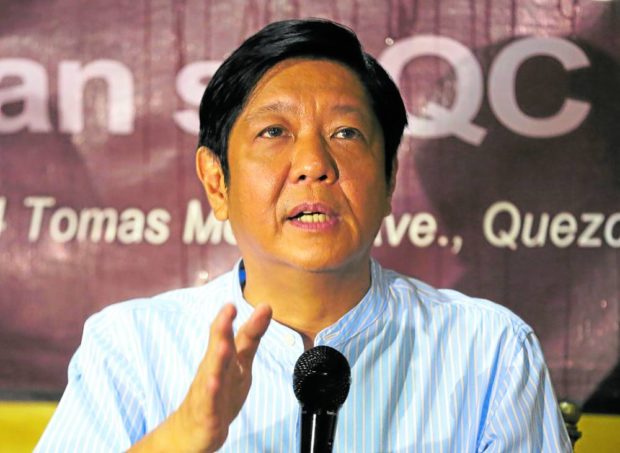Moro fighters to Bongbong: ’70s massacres remain fresh
KADIGASAN, Special Geographic Area, Bangsamoro, Philippines — Launching his vice-presidential bid in 2016, then Sen. Ferdinand Marcos Jr. hearkened back to his father’s era, describing it as “a time when the Philippines was seen as a bright light in the community of nations when we ourselves were proud to be Filipinos.”
“We enjoyed that time. Unfortunately, that time has passed. It’s time to return to that moment in time,” said the son and namesake of the late dictator, as quoted in the documentary “The Kingmaker.”
But for the Moro fighters in Mindanao who endured four decades of conflict to defend their way of life and establish self-rule, a return to that past would be a nightmare.
“We can never forget the massacres. How can we allow these to befall us again?” said Noroddin Pananggilan, a member of the Bangsamoro Islamic Armed Forces (BIAF), the armed component of the Moro Islamic Liberation Front (MILF).
According to him, battle-hardened BIAF warriors in the provinces of Cotabato and Maguindanao understand the view among the MILF leadership that Vice President Leni Robredo could be trusted more to preserve the still-fragile peace in Mindanao.
Article continues after this advertisement“If Marcos wins, the Bangsamoro loses. Marcos is a mortal enemy of the Muslims,” Pananggilan said.
Article continues after this advertisement‘Genocide’
Younger members of the BIAF are just as aware of the persecution of Muslims during Marcos’ time.
“The Marcos years were bloody and brutal to the Muslims and indigenous peoples of Mindanao, as Marcos Jr.’s father waged a merciless war of genocide against our people, killing thousands,” read a manifesto issued on April 25 by the BIAF commanders.
They said “the sins of the father are not the sins of the son. But the son who does not see wrong in what the father did eventually copies and becomes what the father was.”
A member of the BIAF in his thirties who requested to be identified merely as Ronnie cited such incidents during the Marcos years as the 1971 massacre of 70 Moros, including women and children, by armed men suspected to be members of the Philippine Constabulary, in Barangay Manili, Cotabato; and the 1974 massacre of about 1,500
Moro men, women, and children in Palimbang, Sultan Kudarat province, by government troops.
These events “continue to be fresh as if it only happened yesterday, because the narratives had been drilled into our minds by our elders as a justification for the Moro revolution,” Ronnie said.
Peace deals
There were 21 other massacres perpetrated by government-backed militias from 1970 to 1971, according to Marjanie Macasalong, a member of the interim parliament of the Bangsamoro Autonomous Region in Muslim Mindanao (BARMM).
These episodes would eventually elicit support among Islamic countries for the Moro rebellion until the Marcos regime was forced to negotiate peace with the Moro National Liberation Front (MNLF) in 1976.
The MILF, a breakaway faction of the MNLF, continued the armed struggle until negotiations with the government led to a peace deal in 2014 establishing the BARMM.
According to Mohagher Iqbal, the chief negotiator of the MILF and now Education Minister of the BARMM, stakeholders in the region are taking a particular interest in the “stand and temperament of the candidates on Bangsamoro issues and concerns.”
“We are fortunate to have had Presidents who…were friendly to the Bangsamoro during their terms of office. Without their strong political will and follow-through to their campaign commitments, it is hard to imagine where the Bangsamoro peace process would be today,” Iqbal said.
‘Female leader’
The MILF’s endorsement of Robredo on April 23 can be seen as taking off from that basis. It also broke some widely held views of leadership among Muslims.
Former Jolo Mayor Hussin Amin said the endorsement took some by surprise, because “Muslims, in general, don’t go for a female leader,” he said.
But former Bongao, Tawi-Tawi, Mayor Sulay Halipa said there should be no hindrance in choosing a woman leader “because we are not in a caliphate society, we are not an Islamic country.”
Halipa also cited Indonesia’s first woman president, Megawati Sukarnoputri.
Degku Maliga, a BIAF battalion commander, said the group is prepared to campaign for Robredo—who has gained a substantial 9 percentage points in Mindanao, according to Pulse Asia’s latest survey conducted on March 17-21.
Strong showing
Yet the most notable facet about the election campaign in Mindanao so far is Marcos Jr.’s strong showing there, despite his father’s grim legacy.
In the Pulse Asia survey, Marcos remained the front-runner in Mindanao with 62 percent after a drop of 6 percentage points, followed by Robredo with a distant 14 percent.
He leads the Bangsamoro region with 52 percent, followed by Robredo with 11 percent.
Iqbal said there was a need to emphasize the “historical injustices in the Bangsamoro context,” which he said “could easily be overlooked.”
He added that “not every Filipino understands the root causes of conflict in our region.” The lessons from the past are instructive in that regard.
